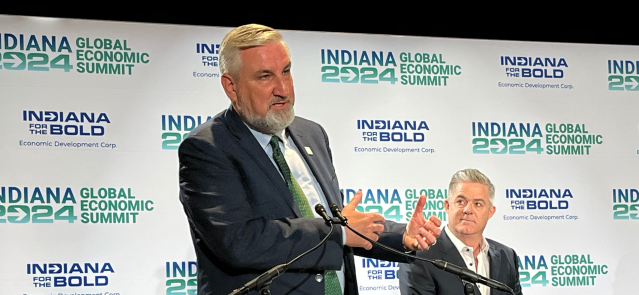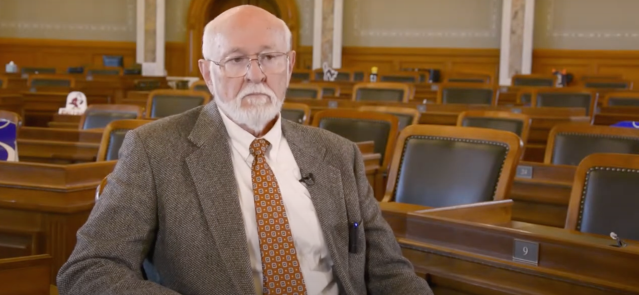YOU DON’T SAY
“We had the best second quarter of any election year we’ve ever had in the history of our committee, and then the Democrats beat us by $7 million.”
U.S. Rep. Richard Hudson, chairman of the National Republican Congressional Committee, on GOP fundraising. (The News & Observer, 7/18/24)
Robinson Fundraising
Colin Campbell, WUNC Radio, 7/18/24
It’s rare for North Carolina political figures to publish an autobiography while running for office, but Lt. Gov. Mark Robinson has made his 2022 book a central part of his campaign for governor.
He’s done book signings for “We Are The Majority” during campaign fundraisers, and invitations to some of his fundraising events have included a free copy of the book as part of the ticket package. He’s also done direct mail fundraising campaigns where potential donors can receive the book if they contribute $75 or more.
“My friend, ‘We Are The Majority’ is a book that needs to be read by every Republican, Independent and conservative Democrat voter who’s considering me for Governor,” Robinson wrote in the fundraising letter. “Frankly, nothing would make me happier than to see 10,000 copies end up in the hands of grassroots leaders, fellow elected officials, moms, dads, seniors — folks just like you!”
So, how much is Robinson’s campaign spending to purchase copies of the book for donors? The campaign hasn’t disclosed that figure anywhere in his campaign finance reports or ethics disclosure forms.
Asked about the omission, campaign spokesman Mike Lonergan said in an email that “these promotions were handled directly by the vendors. The campaign reported the expenses as required.” Lonergan did not answer a follow-up question from WUNC about which vendor listed in the campaign finance reports was responsible for the book purchases.
Some of Robinson’s campaign spending appears to be lumped into categories labeled “consultant.” His campaign lists a total of $450,000 spent this cycle on “consultant — political” through the firm Conservative Connections, led by his campaign manager Conrad Pogorzelski. And reports list $1.12 million spent on “consultant — fundraising” through the firm The Whillier Group, led by a former staffer for Lt. Gov. Dan Forest.
But Robinson’s campaign lists other purchases of gifts for donors and supporters separately. He’s spent nearly $45,000 on campaign “merch” through a Florida-based company called The MAGA Mall USA Corp., the report shows.
The company’s website offers red “Mark Robinson For Governor” hats alongside former President Donald Trump’s signature “Make America Great Again” hats, as well as anti-Joe Biden apparel with messages like “Joe and the Ho Gotta Go.”
Robinson doesn’t list proceeds from the book on ethics disclosure forms filed with the State Ethics Commission. The form requires candidates and elected officials to list any source of income that exceeds $5,000. Robinson lists only his lieutenant governor’s salary and his wife’s nonprofit salary for 2023. Asked about the ethics disclosure, Robinson’s campaign said, “revenue from book sales did not meet the threshold for disclosure.”
Earning less than $5,000 in the first full year of a book’s publication would mean Robinson sold significantly less than other politicians who have written books. Business Insider reported that in 2020, more than 20 members of Congress earned more than $5,000 from book royalties and advances, with some making more than $300,000.
While sales figures for Robinson’s book aren’t publicly available, it’s currently ranked #82,986 in sales on Amazon and #437 in political leader biographies. About a month after it was published in 2022, it ranked #3,052 among books on Amazon and was the 22nd most popular title among biographies of political leaders.
Bob Hall, a longtime campaign watchdog who has filed complaints about Robinson’s past campaign finance reports, said the book purchases need to be disclosed. “That income should be reported somewhere, either on his ethics statement as income, or on his campaign finance report is the campaign’s income,” Hall said.
Campaign finance reports vary significantly on how much they list individual expenses versus a lump sum to a consultant. House Rules Chairman Destin Hall’s latest report includes an array of expenses like lodging, mileage and office supplies in a single payment to his campaign consultant. By contrast, Republican lieutenant governor candidate Hal Weatherman’s report lists separate expenses for purchases like yard signs, banners and flag patches to place on campaign t-shirts.
The State Board of Elections is still reviewing a complaint filed by Hall three years ago. The complaint says Robinson’s 2020 finance report included unexplained cash withdrawals, spending on inappropriate expenses like medical bills and clothing, and donations that exceeded the maximum limit. “They are overwhelmed and underfinanced, so it’s hard to say” when the investigation might conclude, Hall said. [Source]
Matthew Sasser, State Affairs Pro, 7/18/24
Education professionals at an American Enterprise Institute event Wednesday issued a clarion call to state leaders and school districts around the country to cut students’ chronic absenteeism by 50% over the next five years.
Chronic absenteeism is defined as missing 10% of the school year, equivalent to at least 18 calendar days.
Nat Malkus, deputy director of education policy studies at American Enterprise Institute, said this nonpartisan goal remains the most urgent issue facing schools today.
“It’s necessary because leadership at the top needs to raise this as the top priority for this school year,” Malkus said. “This is not something to start in on in December. … This is one of those places where the bully pulpit at the state level can raise priorities, and that can trickle down. So, yes, districts need the support and the pressure from states to turn this around.”
The goal of cutting the rate by 50% over the next five years is ambitious, audacious and aspirational but achievable, according to Denise Forte, president of The Education Trust, a nonprofit organization committed to advancing policies to dismantle racial and economic barriers in the American education system.
In 2019, 15% of K-12 students in the United States were considered chronically absent, Malkus said, according to data collected by the Return 2 Learn Tracker.
“Pre-pandemic, chronic absenteeism was not a minor issue,” Malkus said. “Chronic absenteeism is related just to a bevy of negative effects. It’s not complicated — I think schools are good. I think being in schools consistently is good, and the data bears this out.”
Data for the 2020 and 2021 school years remains difficult to track due to the lack of in-person learning. In 2022, rates for chronic absenteeism skyrocketed to 90% across the country.
“I’m a data guy. I do all kinds of education data,” Malkus said. “I’ve never seen anything like it. …. There’s no jurisdiction or state that didn’t increase dramatically.”’
While no state was immune to the effects of the COVID-19 pandemic, chronic absenteeism reflected existing gaps between high- and low-achieving schools, with lower-performing schools having fewer regular student attendance.
Hedy Chang, executive director of Attendance Works, a national initiative aimed at advancing student success by addressing chronic absence, noted that while absenteeism rates in many school districts are slowly recovering, some are getting worse. Another challenge for policymakers, Chang noted, is the difficulty of comparing rates across states that define chronic absenteeism or what constitutes a regular school day differently.
“This is the real threat that we’re looking at now — is that chronic absenteeism doesn’t go back down, that it becomes a new normal,” Malkus said about a post-pandemic casualness that has taken root.
It’s going to take more than just a political response, according to Malkus, but a sustained cultural response that parents can buy into and reestablish learning and regular attendance as priorities.
Angélica Infante-Green, commissioner of elementary and secondary education for the Rhode Island Department of Education, said a survey in her state asked parents if two days of student absence made a difference.
“We saw that they didn’t think it made a difference,” Infante-Green said. “That was really important data for us to get out there and say, ‘OK, where were the districts where this happened? Where were the schools? Let’s get [our student absenteeism campaign] out there.”
Learning loss from the pandemic has been identified as a key area for educators to hone in on, but Malkus said it’s for naught if students aren’t sitting ready to receive instruction in the classroom now.
“I don’t see any root of pandemic learning loss being fixed that doesn’t go through fixing this chronic absenteeism rate,” Malkus said. “We’re talking about somewhere on the order of six and a half million more kids chronically absent post-pandemic than pre-pandemic.”
Forte said it’s going to take everybody — parents, state leaders, educators — to make the goal of getting kids back in the classroom a reality.
“This is a change in our norms and routines and behaviors,” Malkus said about the goal-setting, adding that many of his colleagues have dismissed the importance of this issue.
“It’s a big deal for your community, your school, your kids — the numbers do not lie. I think it’s incumbent on us to really realize that we do have a role, and I think it’s important for us to not just treat this as a goal for state leaders or some district superintendent to hold, but it’s important for us as America, as our school districts, as our communities, to cut chronic absenteeism and to do it now before it becomes a new normal.”
Drought Conditions
Jane Winik Sartwell, Carolina Public Press, 7/18/24
After the driest June in recorded North Carolina history, farmers across the state are coping with the impacts of intense drought. According to the US Drought Monitor, 22 North Carolina counties are experiencing severe drought, while one county — Columbus County, a rural, agriculturally driven county in the southeastern part of the state — is in an extreme drought.
From early June to mid-July, Whiteville, Columbus County’s biggest population center, received 1.07 inches of rain, a 24-year low. The suddenness of this drought is what surprises the state’s drought experts the most.
“If you asked somebody on Memorial Day, ‘Are we at any risk of drought?’ they would have called you crazy,” Corey Davis, drought expert at the North Carolina State Climate Office, told Carolina Public Press.
“It wasn’t one of these typical droughts, where it just kind of creeps up month after month and gets slowly worse,” Klaus Albertin, chair of the North Carolina Drought Management Advisory Council, told CPP. “This has been so sudden.”
On July 2, 10 counties were classified as experiencing severe or extreme drought. By July 9, that number had jumped to 22.
These counties fall into three geographic clusters: the southeast, central Coastal Plains, and the northwest Piedmont.
- Southeastern counties in severe and extreme drought: Columbus, Robeson, Bladen, Pender
- Central Coastal Plains counties in severe drought: Bertie, Martin, Pitt, Beaufort, Craven, Pamlico, Lenoir, Greene, Wayne
- Northwest Piedmont counties in severe drought: Surry, Stokes, Forsyth, Yadkin, Wilkes, Alexander, Iredell, Davie, Catawba, Caldwell
This past week brought a few inches of rain to the state, but not enough to pull the counties like Columbus out of their deficit, and entirely too late for corn farmers.
“The corn is basically decimated,” Gary Lanier, Columbus County’s economic development director, told CPP. “You look out in the field and see brown spokes. It’s killing our farmers.”
It’s too late in the season to replant, and many farmers are looking to crop insurance to keep them from going bankrupt. Still, Lanier explained, “crop insurance only covers 70% of your average production for five years. Farmers are still going to lose something like $200/acre.”
About 100 miles north of Whiteville, in rural Greene County, the Farm Service Agency is currently discussing a disaster declaration. According to Hannah Massengill, field crops extension agent for Greene County, farmers there expect anywhere from a 70% to 80% loss on the corn crop.
“(The emergency) declaration would initiate various support mechanisms for our farmers,” Trey Cash, economic development director for Greene County, told CPP in an email. “While this assistance is greatly valued, it’s important to acknowledge that our farmers prefer to sustain their livelihoods through their hard work and successful harvests.”
Because of the drought’s suddenness, crops have been hit much harder than drinking water supply. Reservoirs and aquifers are, for the most part, still full from the heavy rains in May. Only five voluntary water conservation notices have been issued on account of the drought throughout the state, including one in Whiteville.
In Wilkes County, in the western part of the state, the level of the Kerr Scott Reservoir dropped just one inch below the normal level on Tuesday for the first time all season.
In Forsyth County, home to Winston-Salem and the largest population of any county currently under severe drought conditions, only one out of the three factors needed to trigger the emergency water management plan has occurred: the drought declaration itself. The level of system demand and the flow of the Yadkin River remain unaffected. [Source]
Woodson Retirement
Korie Dean, The News & Observer, 7/18/24
NC State University Chancellor Randy Woodson will retire next summer, ending a 15-year tenure leading the Wolfpack. He announced his plans to retire at a meeting of the NC State Board of Trustees in closed session Thursday afternoon.
“As I told the trustees, it’s been my honor, and really the honor of my professional career, to serve as chancellor of this great university now for almost 15 years,” he said in open session afterward.
Woodson became the Raleigh university’s 14th chancellor in 2010. With a research background in molecular plant biology, he joined NC State after more than two decades at Purdue University in Indiana, where he became provost in 2008.
Woodson’s announcement of his upcoming retirement comes at a time of significant turnover for chancellors across the UNC System. Already this year, new leaders have been named for four universities in the 17-campus system, and three additional searches are underway or soon-to-begin.
UNC System President Peter Hans addressed the turnover Wednesday after a meeting of the ongoing UNC-Chapel Hill chancellor search, saying he attributed much of the trend to natural cycles, such as chancellors reaching their retirements or choosing to make changes in their career after the COVID-19 pandemic.
At a time when the average tenure for college presidents and chancellors nationwide is less than six years, Woodson’s nearly 15-year tenure at NC State stands out. Woodson is one of the longest-serving chancellors currently in the UNC System. (North Carolina A&T State University Chancellor Harold Martin, who officially retires next month, is the longest-serving.) He is the third-longest-serving chancellor in NC State history. [Source]
Convention Speeches
Danielle Battaglia, McClatchy, 7/18/24
Just hours before former President Donald Trump is set to take the stage at the Republican National Convention Thursday night, a North Carolina congressman delivered his own speech to an audience of 50,000.
U.S. Rep. Richard Hudson, a Republican from Southern Pines, gave the second speech of Thursday night, which marked the last evening of the Republican National Convention. He then joined Trump in his presidential box to watch the convention.
“A Republican House is … essential to ensuring Donald Trump’s success as our president,” Hudson told the convention. “Can you imagine? Can you imagine what Nancy Pelosi’s protege, Hakeem Jeffries, would do if he was speaker of the House, to undermine Donald Trump?”
Hudson had teased portions of his speech in an exclusive interview with McClatchy on Wednesday afternoon and explained why he believed it was essential for the House to have a Republican president and why Trump needs a majority in the House.
Hudson serves as chairman of the National Republican Congressional Committee, and in the role oversees the campaign to elect Republicans to the House. This week, campaign finance reports were due to the Federal Election Commission.
“We had the best second quarter of any election year we’ve ever had in the history of our committee,” Hudson said. “And then the Democrats beat us by $7 million.”
Historically, Democrats raise more than Republicans, Hudson said, which he adds come from their connections to labor unions, billionaires and some Democratic foundations. By one measure, Hudson said, Democrats outspent Republicans by $100 million in the last election cycle, even as Republicans gained enough seats to narrowly take over the House.
“We lost eight to 10 seats because we got outspent” in those races, Hudson said. “So my goal has always been keeping it close. Overall, they’ve out-raised us, but I’ve kept the cash-on-hand difference very tight, so as long as we start with how much money we have to spend, if I can keep that close, we’re going to be very successful.”
North Carolina has only one truly competitive House race, and that’s the 1st Congressional District race, between incumbent Democratic Rep. Don Davis and retired Army Colonel Laurie Buckhout.
“I’m really excited about Laurie Buckhout,” Hudson said. “I think she’s going to win. Roll Call said that Don Davis is the second most vulnerable Democrat. He’s a good guy. He’s affable. I like him, but he doesn’t vote right.”
In May, Voteview, which tracks the political ideology of each member of Congress, showed that Davis votes with his party 88% of the time, while the rest of the state’s Democrats vote with the party at least 94% of the time.
Hudson said looking around the country, he’s feeling good about how House Republicans are spending their campaign dollars, and the strategy they have to maintain the House majority.
Also on Thursday, Charlotte evangelist Franklin Graham prayed for former President Donald Trump and for unity in the wake of the recent attempt on Trump’s life. Speaking to convention-goers in Milwaukee, Wisconsin, after professional wrestler Hulk Hogan and before Trump himself, Graham offered a moment of reflection, praying “for the leaders of our nation, whether they’re Republican, Democrat or Independent.”
Graham is president of the Charlotte-based Billy Graham Evangelistic Association, named for his late father, Billy Graham. He also leads the Boone-based Samaritan’s Purse, an international crisis-response organization. He expressed condolences to the family of Corey Comperatore, who was shot and killed by a man accused of trying to assassinate Trump at a Saturday rally in Pennsylvania. “I cannot explain why God would save one life and allow another one to be taken. I don’t have the answer for that,” he said.
Graham said during his remarks he was speaking “as a private citizen.” He praised Trump for appointing conservative judges during his presidency and for his administration’s work to help get American pastor Andrew Brunson freed from a Turkish prison in 2018.
Annette Albright, who ran for the Charlotte-Mecklenburg school board multiple times, also spoke Thursday.
During her 2023 campaign for an at-large seat on the CMS board — a nonpartisan election — Albright and two other candidates faced accusations from a progressive group for having ties to the Republican Party of Mecklenburg County. Both Albright and the MeckGOP have denied those allegations. But since the election, Albright has been a vocal critic of Democrats on social media.
Asked whether speaking at the Republican convention would affirm those past claims made against her, Albright told The Charlotte Observer last week she has “to go where I am respected and where I am appreciated and where I’m wanted.”
On Thursday, she said she’s registering as a Republican and planning to vote for Trump because she’s in favor of school choice and more discipline in schools. She sued CMS for wrongful termination after she was fired after a 2016 video circulated of her being attacked by students at Harding High School. The suit was settled in 2018. “It didn’t take long for me to realize that public schools are a part of the problem,” she told the convention. [Source 1] [Source 2]
Teacher Resignations
Amy Diaz, WFDD Radio, 7/18/24
A handful of women gathered inside of Jessica McCrory’s living room in Winston-Salem one afternoon in April. She was hosting a meetup for the advocacy group MomsRising, where members organize around issues impacting women, mothers and families. A couple of the women brought their babies, which made sense, seeing as the topic of discussion for this gathering was the state’s shortage of child care.
One by one the moms went around the room sharing their own experiences of having children, struggling to find care, and for some, leaving their jobs. McCrory started them off. She said she decided to take a year off to sort out child care, and then go back. She looked for day cares, half-day options, and potentially hiring a nanny, or asking family members to fill in the gaps. But she says the only solution that made sense was for her to stay home. What she thought would be one year away from school, turned into 12.
North Carolina, and Forsyth County specifically, are considered child care deserts. The average monthly cost for a day care program is about $800 per child, but even parents who can pay for that struggle to find slots. And the issue stands to worsen.
Federal emergency child care stabilization funds ran out in June. The North Carolina legislature allocated roughly $68 million to providers to compensate, somewhat, for the loss. But experts say without further investment, more and more of these centers will close. That impacts employees in all sectors. But with a teacher shortage happening simultaneously, some believe the two issues may be linked.
According to North Carolina’s State of the Teaching Profession Report, child care needs was one of the top reasons teachers left their jobs last year, right behind making a career change and retiring with full benefits.
The state lost 709 teachers in the 22-23 school year because they had family responsibilities. Over the past five years, that reason has accounted for nearly 3,000 public school teachers leaving their jobs.
And it’s not just teachers leaving their jobs. A report by the U.S. Chamber of Commerce published this year found that child care issues result in an estimated loss of more than $5.5 billion annually for North Carolina’s economy.
The research also found that because of these challenges, a quarter of surveyed households in the state experienced changes to their employment situation— with another 15% of working parents planning to leave their jobs within the next year.
In North Carolina, about 80% of teachers are women. But the landscape of child care options in the state doesn’t make it easy for mothers to stay in those jobs. And for the ones that do, the conditions and demands of being a teacher make it difficult to do their other job— being a mom. [Source]
Ballot Suit
Steve Harrison, WFAE Radio, 7/18/24
The Justice For All Party said Thursday that it will file a lawsuit challenging the North Carolina Board of Elections decision this week not to certify the organization as a political party. That decision means its candidate, progressive academic Cornel West, can’t appear on the state’s ballot for president.
Italo Medelius, the chair of North Carolina’s Justice For All Party, said the group was “expecting the denial” and “has a legal team ready.” He said the group “fully expects to be on the ballot in November.”
The Democratic-majority elections board voted 4-1 to certify the We The People Party, allowing Robert F. Kennedy Jr. to appear on the ballot for president. But it voted 3-2 against allowing Justice for All a spot on the ballot, after elections board staff found people who said they either hadn’t signed the party’s petition or didn’t know what it was for.
After the vote, West wrote on social media that “Democracy is under attack! The NC Board of Elections and the Democrats are blocking the Justice For All Party from the ballot. We must stand up and fight back! Demand justice and ensure every vote counts.” [Source]
Judicial Recusal
Noah Pransky, Brooke Williams and Andrew Botolino, ProPublica, 7/18/24
Concerns that judges on the nation’s highest courts have not properly disclosed personal conflicts — and have failed to recuse when such issues arose — have been at the center of a recent national debate. Supreme Court Justices Clarence Thomas and Samuel Alito have faced calls to recuse themselves from cases due to their wives’ political activities. Chief Justice John Roberts’ wife has a high-powered job as a headhunter for law firms with Supreme Court practices.
Last year, ProPublica exposed how Thomas and Alito took trips funded by billionaires but failed to properly disclose them. In 2021, The Wall Street Journal found at least 131 judges broke the law by hearing cases in which they had a financial interest. And in 2020, Reuters identified thousands of judges who broke the law but remained on the bench.
A ProPublica analysis found a lack of transparency regarding conflicts plagues federal and state courts where loose rules, inconsistent enforcement and creative interpretations of guidelines routinely allow judges to withhold potential conflicts from the parties before them.
In an examination of more than 1,200 federal judges and state supreme court justices, ProPublica, in partnership with student journalists at Boston University, found dozens of judges, including both Republican and Democratic appointees, who chose not to recuse when facing potential appearances of impropriety involving familial financial connections. Ethics experts say that the judges’ interpretation of the rules may often lie within the letter of the law, but at the expense of its spirit.
In North Carolina, Supreme Court Justice Phil Berger Jr. has repeatedly heard cases in which his father, Senate President Pro Tem Phil Berger Sr., not only publicly lobbied for a specific result but also was a named party in the case. The justice repeatedly sided with his father’s interests, including cases in which Phil Berger Sr. was a named defendant: a challenge to the constitutionality of a partisan redistricting plan and a challenge to a voter ID law spearheaded by Phil Berger Sr.
The justice had recused himself from the voter ID case while serving on the Court of Appeals but said he did not need to as Supreme Court justice because his father was a defendant only in his “official capacity.”
Amid calls to bring conflict-of-interest laws into the 21st century, a bevy of Band-Aids have been proposed, but no comprehensive solutions. Experts hesitate at the suggestion of tougher recusal rules, fearing mass disqualification could shut down the judiciary. Most also reject the idea of limiting judicial spouses’ careers or speech.
The Brennan Center for Justice at NYU School of Law proposed a series of reforms in 2016, including independent review of all motions for disqualification — at both the U.S. and state supreme courts — so judges don’t effectively serve as the final arbiters of their own biases. Brennan also advocated ending the common practice of judges keeping their reasons for recusal — or non-recusal — secret, which can stymie the appeals process and create a void in case law.
Critics have argued the reforms could slow the wheels of justice and allow political actors to weaponize recusal.
Many advocates for reform see transparency measures as an achievable next step. “The fix is really hard,” said Amanda Frost, professor of law at the University of Virginia. But “transparency would improve the process for everyone.” [Source]
Harris Rally
Dawn Baumgartner Vaughan and Emmy Martin, The News & Observer, 7/18/24
Vice President Kamala Harris returned to North Carolina on Thursday, a week after her last visit here, and spoke to supporters at a campaign event in Fayetteville. This is Harris’s seventh visit to the Old North State this year, according to her campaign.
It’s her second visit since President Joe Biden’s June 27 debate with former President Donald Trump, who is speaking at the Republican National Convention on Thursday, the final night of the event.
Harris talked about the RNC and Trump making his pick for vice president, Ohio Sen. J.D. Vance, saying Trump’s selection was trying to distract people from attention on Trump’s record as president and Project 2025, the Heritage Foundation-written policy plan for a Trump presidency. She said Trump was suggesting that he and Vance “are going to prioritize the middle class. But we are not buying it.”
Harris also said that Republicans are trying to proclaim themselves as the party of unity, “but if you claim you stand for unity, you need to do more than just use the word.”
She criticized Republicans for abortion restrictions and those who wanted to overturn the 2020 election.
The vice president’s speech echoed her speech a week ago in Greensboro and previous campaign speeches, giving highlights of their administration’s successes, like keeping the cost of prescription drugs down for older people.
Air Force Two landed at Pope Army Airfield around 12:30 p.m., according to the press pool, and Harris was greeted by Democratic Gov. Roy Cooper. Also greeting her were Cumberland County Board of Commissioners Chairman Glenn Adams; Fayetteville Mayor Mitch Colvin; Lt. Gen. Christopher Donahue, commander of the XVIII Airborne Corps and Fort Liberty; and Col. Allen C. Morris Jr., commander of the 43rd Air Mobility Operations Group and Task Force Gryphon.
As a crowd waited for Harris, Cooper took the stage at Westover High School in the school’s Gene Arrington Gymnasium. His speech echoed previous campaign speeches, and he talked about what “Donald Trump’s America” would be.
“This election is not just about what president we want to have, this election is about what kind of country we want to be,” Cooper said.
Earlier, Colvin received applause after mentioning the Biden administration’s investment in historically Black colleges and universities. Fayetteville is home to an HBCU, Fayetteville State University. The gymnasium echoed with cheers and claps from the crowd as several speakers emphasized flipping North Carolina blue. [Source]
Convention Guests
Danielle Battaglia and Korie Dean, The News & Observer, 7/17/24
They’ve been called “patriotic fraternity brothers.” And on Wednesday night, seven members of UNC-Chapel Hill fraternities appeared at the Republican National Convention carrying American flags and being honored for having “protected our American flag.”
The seven men walked down the front two aisles of Fiserv Forum in front of the 50,000 people attending the convention. Their walk took four of them past the delegates from their home state, as well as those from Ohio, Louisiana, Nebraska and Missouri.
Delegates reached out to shake their hands or give them a pat on the back, as Brian Kelley sang “American Spirit” on stage with a choir from Milwaukee’s Holy Redeemer Institutional Church of God in Christ.
Alex Johnson, one of the fraternity members, took a microphone from his back pocket and explained that when “a mob” of pro-Palestinian protesters tried to remove the American flag from the Chapel Hill campus, the fraternity brothers protected it out of respect. “Too many people have sacrificed everything for it,” he said. “The least we could do was keep it flying. And tonight we are proud to honor our flag again.”
The group was among two dozen individuals or groups described as “everyday Americans” tapped to speak at the four-day convention. The Trump campaign described the speakers as people “who have faced immense hardship and are worse off under the Biden-Harris administration.”
The fraternity members went viral this spring for keeping the American flag that hangs on UNC’s Polk Place from touching the ground after pro-Palestinian protesters attempted to remove it on April 30, a day that saw 36 people charged in connection to a “Gaza Solidarity Encampment” that had been set up on the quad for several days. The protesters’ attempted removal of the flag marked the second time that day they had done so. An earlier attempt was successful, and interim Chancellor Lee Roberts led police in restoring it to the flagpole.
The day after the hours-long flag stand-off, a GoFundMe online fundraiser appeared in honor of the fraternity members, asking for money to “throw ‘em a rager.” With an original goal of $15,000, the fundraiser eventually garnered more than $500,000. The money is being used to plan and throw “Flagstock 2024,” an invite-only event to be held on Sept. 2 with a performance by John Rich of the country duo Big & Rich.
Leftover funds not used for the party will be donated to charities, possibly including Back the Blue NC, Wounded Warrior Project, Children of Fallen Patriots and Zeta Beta Tau Foundation to Combat Anti-Semitism, according to the GoFundMe. [Source]
Price Interview
Sydnee Scofield, WTVD News, 7/18/24
As a growing number of sitting Democrats call for President Biden to step aside in his bid for re-election over concerns about his fitness for office, a longtime Democratic Congressman from North Carolina is weighing in. David Price represented parts of the Triangle on Capitol Hill for more than 30 years, leaving office in 2022.
“I’ve been in politics a long, long time, and I’ve never seen a decision or more critical or important than this one,” Price said about who the Democratic nominee will be in the fall.
Though President Joe Biden has been clear that he intends to stay in the race, making comments that he believes he’s the only person who can beat Donald Trump, Price echoed Rep. Nancy Pelosi’s remarks, saying Biden still has a decision to make. “It needs to be a decision that is made very, very carefully with the due regard for his own condition, his own capability, but also with the country’s needs at this time, which I think very much include a Democratic candidate’s ability who’s able to prosecute a vigorous, hard-hitting campaign,” Price told ABC11.
He would not directly address whether he thinks Biden should step aside, but if he does, he believes Vice President Kamala Harris would be a natural choice to take over the ticket.
“It would be interesting and important, of course, who she was paired with, and there have been interesting conversations about that, including our own Governor (Cooper) but I think Kamala Harris has performed well as Vice President,” Price said.
Regardless of who the Democratic nominee is – Price reiterated how high the stakes are in November. He referenced the rhetoric coming out of Milwaukie this week at the Republican National Convention, and the concern about the future of NATO if Donald Trump wins in November. He also mentioned Trump’s decision to run alongside J.D. Vance as “truly regrettable,” calling him “the most extreme possible choice.” [Source]
Carbon Plan
Peter Castagno, Port City Daily, 7/18/24
Energy consultants, attorneys, and environmentalists raised concerns Duke Energy’s carbon plan disproportionately benefits the utility’s shareholders ahead of next week’s hearings for the utility. Duke’s top shareholders are also the biggest investors in new proposed pipelines in North Carolina.
Expert witness hearings regarding Duke’s near-term and long-term energy plans begin Monday. Duke representatives, utility staff, and intervenors including the Environmental Defense Fund, the Southern Environmental Law Center, and NC WARN will testify before the Utilities Commission over the next few weeks.
H.B. 951, a 2021 state law, requires Duke to reach carbon neutrality by 2050 and reduce carbon dioxide emissions to 2005 levels by 2030. The company’s most recent plan, introduced in January, includes replacing coal with natural gas infrastructure as its largest energy source over the next decade. The NC Utilities Commission is currently reviewing the plan and expected to reject or approve it in November.
Duke’s near-term action plan includes:
- Increasing natural gas production by 8,925 MW by 2033
- Increasing solar energy by 6,460 megawatts by 2031
- Increasing battery storage by 2,700 MW by 2031
- Expanding hydroelectric storage by 1,834 MW by 2034
- Adding 600 MW of advanced nuclear power by 2035
Critics including Will Scott, the southeast climate and clean energy director of the Environmental Defense Fund, argue the plan should put greater emphasis on offshore wind, solar, and battery storage. Scott said technological improvements and federal incentives will make renewables a cleaner and more affordable long-term energy source and allow the utility to meet clean energy transition timelines put forward in H.B. 951.
However, he told PCD the regulatory structure determining Duke’s returns incentivizes large new gas infrastructure projects that benefit shareholders above ratepayers. The Utilities Commission sets a guaranteed “return on equity” during Duke’s rate increase approvals — generally around 10% — which ensures returns for capital invested in its projects.
Under H.B. 951, Duke is allowed to fully own any resource except utility scale solar and solar plus storage, providing an incentive to focus on projects it can charge to its rate base. Duke also lobbied for the bill to include multi-year rate-increase requests, providing greater certainty to shareholders. [Source]
Asheville Reparations
Sarah Honosky, Asheville Citizen Times, 7/18/24
At its final scheduled meeting on July 15, the historic Community Reparations Commission had a clear message: We need more time.
Commission Chair Dewana Little reviewed a six-month extension request, taking the CRC through the end of the year, which will be presented to Asheville City Council on Aug. 27, city spokesperson Kim Miller said July 17.
City staff responded after Little’s proposal with a recommendation that some commission members say comes in “opposition” to their request: For the city to continue its current level of support only through October.
The process has not always been a smooth one. In July 2020, Asheville City Council passed a resolution supporting reparations for Black Asheville, which tasked the city with establishing a process to develop short-, medium- and long-term recommendations to repair damage caused by public and private systemic racism. Shortly after, the county passed a similar resolution.
Asheville and Buncombe County are among the first locales in the country to undertake such an effort.
Little said an extension was needed, in part, due to some of the accompanying complications — Like “repeated changes” around project management, inconsistent timelines, delays in accessing data and lack of time/capacity for research. In the more than two years since its formation in April 2022, the reparations commission has seen three different project managers, as well as turnover in both the city and county’s equity offices and on the commission itself. In May, Dwight Mullen stepped down as chair and was replaced by Little.
With the extension, Little said they could finalize the report, continue community engagement efforts, form and organize an accountability council, create a nonprofit to establish a private fund for reparations and more. This is work she said is necessary to complete the “full charge” of the CRC.
This was not the first call for an extension. In October, the CRC requested an eight-month extension to their two-year timeline, which would have prolonged the process until December 2024. Both city and county agreed only to a June extension.
Commissioner Dwayne Richardson likened the reparations process to “trying to build a car while we drive it,” and said it feels sometimes as though the goals of the reparations commission are “pushing against” the objectives of city and county government. The county is not considering an extension request. Spokesperson Lillian Govus said the county would continue staffing the commission via its Equity and Human Rights Office. Once the commission finalizes its recommendations, she said, they will go before the Board of Commissioners for consideration “as appropriate.” [Source]
Catch Reporting
Gareth McGrath, USA Today Network, 7/18/24
North Carolina’s recreational fishermen will have a year reprieve from having to report their catches of several popular fish species to state regulators. But the requirement, which has proven unpopular with fishermen and even state officials, isn’t going anywhere.
The new rule requires that anyone who recreationally harvests red drum, flounder, speckled trout, striped bass, and weakfish in the state’s coastal or inland waters must report that harvest to the N.C. Division of Marine Fisheries (DMF).
Additionally, the law requires anyone holding a commercial fishing license who is engaged in a commercial fishing operation to report all fish harvested to DMF, regardless of sale. The requirement was originally scheduled to come into effect on Dec. 1, but it will now be delayed until December 2025 after Democratic Gov. Roy Cooper declined to veto or sign the Senate bill that included the catch-reporting delay language.
The original House bill that included the reporting language also was vetoed by Cooper, who expressed concerns about a host of provisions in the regulatory reform legislation. But the governor’s veto was overridden by Republicans who have supermajorities in both chambers of the N.C. General Assembly.
The N.C. Wildlife Resources Commission (WRC) and DMF are still working out all the fine details. But according to a DMF informational posting on the new rules, recreational fishermen would be required to report how many fish were caught, when they were caught, the area where they were harvested, and the type of gear used.
While nearly everyone admits the new requirements will mean more red tape and potential headaches for fishermen, the hope is it will eventually provide regulators with better data.
That’s vital since both recreational and commercial fishermen often question the accuracy of information scientists use to determine catch quotas and harvest windows, especially with popular sought-after species like flounder. State fisheries officials have faced enormous criticism in recent years as they have shortened the recreational flounder window from a year-round open season just a few years ago to only two weeks in 2023 and a complete closure in 2024 − even as some fishermen report seeing large and healthy flounder populations in coastal waters. [Source]
Traffic Circle
Richard Stradling, The News & Observer, 7/18/24
Pinehurst may be best known for golf, but many residents also say they were attracted by the feel of the place — a village of small shops and restaurants, historic homes and inns all shaded by its namesake trees. And residents say adding to that ambiance is a big, wooded traffic circle where U.S. 15-501, N.C. 211 and N.C. 2 meet about a mile from the center of town.
The N.C. Department of Transportation says the 68-year-old traffic circle is inefficient, no longer safe and can’t handle the growing volume of cars. After years of study, the NCDOT has proposed replacing the circle with a large intersection and a new connector road. But many residents don’t want the circle and its trees replaced in the name of efficiency. More than 2,000 have signed a petition asking NCDOT to find a way to improve the circle without destroying it — a message echoed on lawn signs throughout the village.
Hundreds of residents who showed up at Pinehurst Elementary School on Tuesday for the first of three NCDOT meetings to learn more about the proposal and give their feedback. Some had ideas and alternatives, ranging from adding speed bumps and an extra lane to the circle to building a new bypass road around town.
The Pinehurst Traffic Circle was built in 1956, when the population of surrounding Moore County was about a third of what it is now. About 50,000 cars and trucks a day passed through the circle last year, according to NCDOT, resulting in frequent backups as cars merge and crisscross to get in and out of the circle. All that merging results in an unusually high number of crashes, according to NCDOT.
There have been about 840 over the past five years, mostly rear-end collisions as one driver decides to go while the one in front doesn’t, said Craig Scheffler of HNTB, the contractor drawing up the plans for NCDOT. No one has been killed, but those crashes — one every 2.2 days on average — caused an estimated $31 million in damage, according to NCDOT. And conditions will only get worse as the county grows, Scheffler said.
NCDOT projects that about 80,000 cars and trucks will pass through the circle each day by 2050. “Where is that extra 30,000 going to go?” he said. “They’re going to cut through neighborhoods. They’re not going to wait 10, 15 minutes to get through the circle.” [Source]
Legislative Sessions, Studies and Meetings
LB: LEGISLATIVE BUILDING. LOB: LEGISLATIVE OFFICE BUILDING
HOUSE COMMITTEE MEETINGS
Tuesday, July 23
- 9:00 A.M. | House Select Committee on Oversight and Reform, Auditorium.
HOUSE CALENDAR
Monday, July 29, 2024
- House Convenes at 12:00 P.M.
SENATE CALENDAR
Monday, July 29, 2024
- House Convenes at 12:00 P.M.
HOUSE & SENATE: Reconvening allowed under provisions of SB 916, if no sine die adjournment previously adopted.
- Monday, July 29 to Thursday Aug. 1
- Monday, Sept. 9 to Wednesday, Sept. 11
- Wednesday, Oct. 9
- Tuesday, Nov. 19 to Friday Nov. 22
- Wednesday, Dec. 11 to Friday Dec. 13
N.C. Government Meetings and Hearings
BOLD ITEMS ARE NEW LISTINGS
Friday, July 19
- 8 a.m. | North Carolina Medical Board Meeting – July 2024 Meeting, 3127 Smoketree Court, Raleigh.
- 1 p.m. | North Carolina African American Heritage Commission, Thomas Day State Historic Site, Milton.
Monday, July 22
- 9 a.m. | Criminal Justice Education and Training Standards Commission – Executive Committee Meeting, 2211 Schieffelin Road Apex.
Tuesday, July 23
- 11 a.m. | Economic Investment Committee – Meeting, 301 N. Wilmington St. Raleigh.
- 1 p.m. | Governor’s Environmental Justice Advisory Council meets, Halifax County Community College, 100 College Drive, Weldon.
Wednesday, July 24
- 8:30 a.m. | NC Soil & Water Conservation Commission – Business Session, Trinity Road at Martin Bldg, Raleigh.
- 10 a.m. | NC Joint Reentry Council meets, Food Bank of Central and Eastern North Carolina, 1924 Capital Blvd, Raleigh.
Thursday, July 25
- 9 a.m. | N.C. Teachers’ and State Employees’ Retirement System & Local Governmental Employees’ Retirement System – TSERS and LGERS Boards of Trustees Meeting, 3200 Atlantic Ave, Raleigh.
- 9 a.m. | North Carolina Wildlife Resources Commission – Commission Business Meeting, 1751 Varsity Drive, Raleigh.
- 1:30 p.m. | NC State Health Plan for Teachers and State Employees – State Health Plan Board of Trustees, 3200 Atlantic Ave, Raleigh.
Wednesday, July 31
- 10 a.m. | North Carolina State Board of Education meets, 1 South Wilmington St, Raleigh.
Thursday, Aug. 1
- 6 p.m. | The North Carolina Department of Environmental Quality’s Division of Air Quality Public Hearing on Moriah Energy Center Draft Air Quality Permit, Vance-Granville Community College, 200 Community College Road, Henderson.
Monday, Aug. 5
- 9 a.m. | The Board Development Committee of The North Carolina Partnership for Children meets, The meeting will be held via Zoom. You may contact Yvonne Huntley at 984.221.1242 or email at [email protected] for additional information.
Tuesday, Aug. 6
- 9 a.m. | The Council of State meets. 1 South Wilmington St, Raleigh.
Monday, Aug. 19
- 2 p.m. | The Executive Committee of The North Carolina Partnership for Children meets, The meeting will be held via Zoom. You may contact Yvonne Huntley at 984.221.1242 or email at [email protected] for additional information.
UNC Board of Governors
23 S. WEST STREET, SUITE 1800, RALEIGH
Wednesday, July 24
- T.B.A. | The UNC Board of Governors, UNC System Office.
Thursday, July 25
- T.B.A. | The UNC Board of Governors, UNC System Office.
N.C. Utilities Commission Hearing Schedule
DOBBS BUILDING, 430 NORTH SALISBURY STREET, RALEIGH
Monday, July 22
- 2 p.m. | Expert Witness Hearing – Duke Energy Carolinas, LLC and Duke Energy Progress, LLC 2023 Biennial CPIRP | E-100 Sub 190
- 2 p.m. | Expert Public Witness Hearing – Joint Application of DEP and NCEMC for CPCN to Construct a 1360MW Electric Generating Facility in Person County, NC | E-2 Sub 1318, EC-67 Sub 55
- 2 p.m. | Expert Witness Hearing – Application for CPCN for 850 MW Natural Gas-Fired Combustion Turbine Electric Generating Facility Located at 8320 NC Highway 150 E, Terrell, NC 28682 in Catawba County | E-7 Sub 1297
Other Meetings and Events of Interest
BOLD ITEMS ARE NEW LISTINGS
Saturday, July 27
9 a.m. | North Carolina Federation of Young Republicans Convention, The Farm at 95, Selma.m at 95, Selma.








